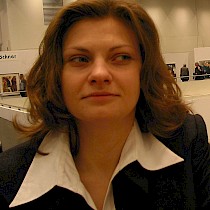Dr. Lioudmila Voropai

Lioudmila Voropai, Dr. phil., is a media theorist, art critic and curator. She studied Philosophy, Art history, Media Studies and New Media Art in Moscow, Cologne and Berlin. In 2013 she accomplished her doctoral thesis on institutionalisation of New Media Art at the KHM Cologne. Her monograph “Media Art as a By-Product: Notes on an Institutional Genealogy of New Artistic Media, Forms and Practices” was published recently by Trancript International Academic Publishing.
From 2011 to 2013 Lioudmila Voropai was a Research Fellow at the Graduate School for the Arts and Sciences of the University of the Arts (UdK) in Berlin, where she worked on a research project focused on critical aspects of establishment of new institutional paradigms such as “Artistic Research”, “Art-Science Interaction” and others.
Currently she is an Assistant Professor at the Department of Art and Media Theory at the University of Arts and Design (HfG) in Karlsruhe (Germany) and works on her postdoc research project that analyses the strategies of conceptualisation in the contemporary art and design practices.
Her curatorial and artistic projects are mainly focused on the institutional critique related issues and fake as an artistic strategy.
As an art critic she contributes to XZ Moscow Art Magazine, Art Issue and other periodicals.
She is also a translator and editor of Russian translations of Slavoj Zizek, Giorgio Agamben, Jürgen Habermas and others.
In 2015 Lioudmila Voropai has founded an open research platform Kulturpessimismus pur – an Independent Institute for Critical Futures Studies.
Her key research interests comprise theory and sociology of contemporary art and digital culture, critical theory, history of new media art, institutional critique, comparative studies in contemporary cultural, educational and science policy, and futures studies.
Synopsis
Futures of Art in a Post-Work Society:
Speculative Policies, Desirable Institutions, Realistic Scenarios
Recent discussions on the upcoming so-called “post-work society” have evoked a wide range of questions about possible developments in various fields of human activity including contemporary art, design and cultural production in general. A prognosticated shift from a traditional concept of “work” as wage labour to “free activity” has inspired countless visions of the future state of art in these fields.
Analysing together both “worst case” and “best case” scenarios, enthusiastic and rather sceptical approaches to certain social, cultural and artistic trends, the paper will present different perspectives, concepts, tendencies and methodologies in dealing with these challenges in the field of future research, planning and policy-making.
The paper reflects on the changes in the modes of functioning, production and reception of art, design and other creative practices, which are caused by the latest technological innovations and their social and cultural impacts and examines various possibilities for a further development in these fields of activity.
Alle Sprecher
- Yasser Almaamoun
- Thorsten Bauer
- Sergey Biniaminov
- Christopher Coenen
- Prof. Ina Conradi
- Prof. Dr.-Ing. Barbara Deml
- Hon. Prof. Joséphine Derobe
- Florian Dohmann
- Felix Gaedtke
- Diego González-Zúñiga
- Prof. Lisa Gotto
- Dr. Lily Hibberd
- Prof. Johan Frederik Hartle
- Dr. Rocio von Jungenfeld
- Sönke Kirchhof
- Mario Klingemann
- Dr. Elias Knubben
- Dr. Sebastian Knorr
- Prof. Verena Kraemer
- Prof. Susanne Kriemann
- Dr. Barbara Kuon
- Prof. Frederic Fol Leymarie
- Roman Lipski
- Anja-Maria Meister
- Prof. Galina Mihaleva
- Prof. Dr. Eduardo R. Miranda
- Lauren Moffatt
- Prof. Julian Oliver
- Prof. Dr. Dr.-Ing. Jivka Ovtcharova
- Gülsel Özkan
- Prof. Matteo Pasquinelli
- Prof. Vesna Petresin
- Prof. Dr. Mark Post
- Oliver Rack
- Prof. Elke Reinhuber
- Prof. Christiane Riedel
- Dr. Ralf Schäfer
- Prof. Benjamin Seide
- Dr. Markus Schmidt
- Kathleen Schröter
- Prof. Aljoscha Smolic
- Prof. Vibeke Sorensen
- Prof. João Tabarra
- Cyril Tuschi
- Holger Volland
- Dr. Lioudmila Voropai
- Yulu Wang
Kontakt
Interesse? Fragen?
Rufen Sie uns an:
+49 (0)721 / 8100 6001
oder schreiben Sie uns:
info@beyondfestival.com




